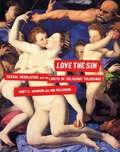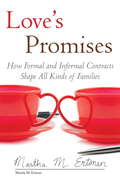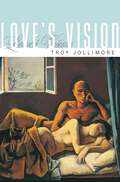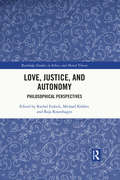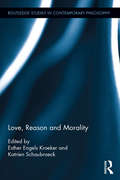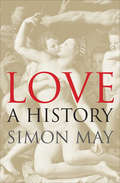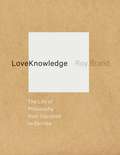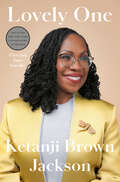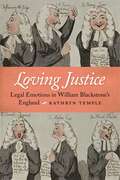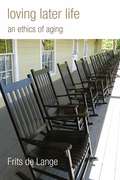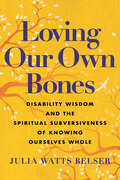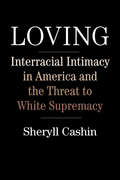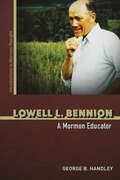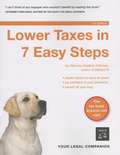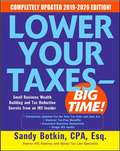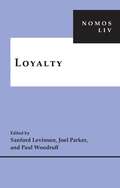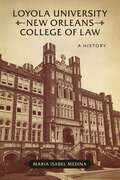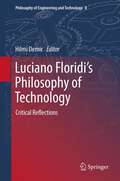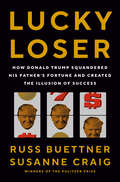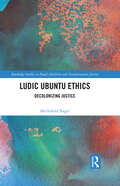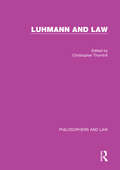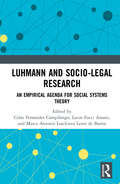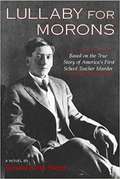- Table View
- List View
Love the Sin: Sexual Regulation and the Limits of Religious Tolerance (Sexual Cultures #39)
by Janet R. Jakobsen Ann PellegriniSex. Religion. There is no denying that these two subjects are among the most provocative in American public life. Even the constitutional principle of church-state separation seems to give way when it comes to sex: the Supreme Court draws on theology as readily as it draws on case law when rendering decisions that touch on sexuality.In this compelling and carefully argued study, Janet R. Jakobsen and Ann Pellegrini examine this powerful and disturbing connection as they explore the reasons why secular institutions habitually use religion to regulate sexual life. From state legislatures to the halls of Congress and the Supreme Court, from daily newspapers to popular magazines and television talk shows, Jakobsen and Pellegrini illustrate the intensity of America's obsession with sex in the name of values and the dangers it poses to some of our most basic freedoms. Using a wide range of case studies, Love the Sin offers an insightful critique of the ways in which sexuality in general and homosexuality in particular are discussed and debated in the public arena. Additionally, the book sets forth constructive alternatives that highlight the vital links between sexual and religious freedom and expose the hazards of using religion as a justification for regulating sexuality.A timely, necessary, and refreshing contribution to the many debates surrounding religion, morality, and sex, Love the Sin boldly dreams an America that lives up to its promise of freedom and justice for all.
Love's Promises
by Martha M. ErtmanBlends memoir and legal cases to show how contracts can create family relationships Most people think of love and contracts as strange bedfellows, or even opposites. In Love's Promises, however, law professor Martha Ertman shows that far from cold and calculating, contracts shape and sustain families. Blending memoir and law, Ertman delves into the legal cases, anecdotes, and history of family law to show that love comes in different packages, each shaped by different contracts and mini-contracts she calls "deals." Family law should and often does recognize that variety because legal rules, like relationships, aren't one size fits all. The most common form of family--which Ertman calls "Plan A"--come into being through different kinds of agreements than the more uncommon families that she dubs "Plan B." Recognizing the contractual core of all families shows that Plan B is neither unnatural nor unworthy of legal recognition, just different.After telling her own moving and often irreverent story about becoming part of a Plan B family of two moms and a dad raising a child, Ertman shows that all kinds of people--straight and gay, married and single, related by adoption or by genetics--use contracts to shape their relationships. As couples navigate marriage, reproductive technologies, adoption, and cohabitation, they encounter contracts. Sometimes hidden and other times openly acknowledged, these contracts ensure that the people they think of as "family" are legally recognized as family in the eyes of the law. Family exchanges can be substantial, like vows of fidelity, or small, like "I cook and you clean." But regardless of scope, the agreements shape the emotional, social, and financial terrain of family relationships. Seeing the instrumental role contracts will help readers better understand how contracts and deals work in their own families as well as those around them. Both insightful and paradigm-shifting, Love's Promises lets readers in on the power of contracts and deals to support love in its many forms and to honor the different ways that our nearest and dearest contribute to our daily lives.From the Hardcover edition.
Love's Vision
by Troy JollimoreLove often seems uncontrollable and irrational, but we just as frequently appear to have reasons for loving the people we do. In Love's Vision, Troy Jollimore offers a new way of understanding love that accommodates both of these facts, arguing that love is guided by reason even as it resists and sometimes eludes rationality. At the same time, he reconsiders love's moral status, acknowledging its moral dangers while arguing that it is, at heart, a moral phenomenon--an emotion that demands empathy and calls us away from excessive self-concern. Love is revealed as neither wholly moral nor deeply immoral, neither purely rational nor profoundly irrational. Rather, as Diotima says in Plato's Symposium, love is "something in between." Jollimore makes his case by proposing a "vision" view of love, according to which loving is a way of seeing that involves bestowing charitable attention on a loved one. This view recognizes the truth in the cliché "love is blind," but holds that love's blindness does not undermine the idea that love is guided by reason. Reasons play an important role in love even if they rest on facts that are not themselves rationally justifiable. Filled with illuminating examples from literature, Love's Vision is an original examination of a subject of vital philosophical and human concern.
Love, Justice, and Autonomy: Philosophical Perspectives (Routledge Studies in Ethics and Moral Theory)
by Michael Kühler Rachel Fedock Raja RosenhagenPhilosophers have long been interested in love and its general role in morality. This volume focuses on and explores the complex relation between love and justice as it appears within loving relationships, between lovers and their wider social context, and the broader political realm. Special attention is paid to the ensuing challenge of understanding and respecting the lovers’ personal autonomy in all three contexts. Accordingly, the essays in this volume are divided into three thematic sections. Section I aims at shedding further light on conceptual and practical issues concerning the compatibility or incompatibility of love and justice within relationships of love. For example, are loving relations inherently unjust? Might love require justice? Or do love and justice belong to distinct moral domains? The essays in Section II consider the relation between the lovers on the one hand and their broader societal environment on the other. Specifically, how exactly are love and impartiality related? Are they compatible or not? Is it unjust to favor one’s beloved? Finally, Section III looks at the political dimensions of love and justice. How, for instance, do various accounts of love inform how we are to relate to our fellow citizens? If love is taken to play an important role in fostering or hindering the development of personal autonomy, what are the political implications that need to be addressed, and how? In addressing these questions, this book engenders a better understanding both of conceptual and practical issues regarding the relation between love, justice, and autonomy as well as their broader societal and political implications. It will be of interest to advanced students and scholars working on the philosophy of love from ethical, political, and psychological angles.
Love, Reason and Morality (Routledge Studies in Ethics and Moral Theory)
by Katrien Schaubroeck Esther KroekerThis book brings together new essays that explore the connection between love and reasons. The observation that considerations of love carry significant weight in the deliberative process opens up new perspectives in the classic discussion about practical reasons, and gives rise to many interesting questions about the nature of love’s reasons, about their source and legitimacy, about their relation to moral and epistemic reasons, and about the extent to which love is sensitive to reasons. The contributors to this volume orient questions related to love within the broader context of the contemporary discussion on practical reasons, and move forward the conversation about the normative dimensions of love. Love, Reason and Morality will be of interest to philosophers working on issues of normativity, meta-ethics and moral psychology, and especially those interested in the source of practical reasons and the role of attachments in practical deliberation.
Love: A History
by Simon May&“What is love? May plunders Western poetry, philosophy and psychology to find answers . . . Thought-provoking stuff&” (The Sunday Telegraph). Love—unconditional, selfless, unchanging, sincere, and totally accepting—is worshipped today as the West&’s only universal religion. To challenge it is one of our few remaining taboos. In this path-breaking and superbly written book, philosopher Simon May does just that, dissecting our ideas of love and showing how they are the product of a long and powerful cultural heritage. Tracing over twenty-five hundred years of human thought and history, May shows how our idea of love developed from its Hebraic and Greek origins alongside Christianity until, during the last two centuries, &“God is love&” became &“love is God&”—so hubristic, so escapist, so untruthful to the real nature of love, that it has booby-trapped relationships everywhere with deluded expectations. Brilliantly, May explores the very different philosophers and writers, both skeptics and believers, who dared to think differently: from Aristotle&’s perfect friendship and Ovid&’s celebration of sex and &“the chase,&” to Rousseau&’s personal authenticity, Nietzsche&’s affirmation, Freud&’s concepts of loss and mourning, and boredom in Proust. Against our belief that love is an all-powerful solution to finding meaning, security, and happiness in life, May reveals with great clarity what love actually is—and what it means. &“The most persuasive account of love&’s nature I have ever read.&” —Financial Times &“Intellectually engaging . . . Provocative.&” —The Wall Street Journal
LoveKnowledge: The Life of Philosophy from Socrates to Derrida
by Professor Roy BrandSince its inception, philosophy has struggled to perfect individual understanding through discussion and dialogue based in personal, poetic, or dramatic investigation. The positions of such philosophers as Socrates, Spinoza, Rousseau, Nietzsche, Foucault, and Derrida differ in almost every respect, yet these thinkers all share a common method of practicing philosophy—not as a detached, intellectual discipline, but as a worldly art. What is the love that turns into knowledge and how is the knowledge we seek already a form of love? Reading key texts from Socrates to Derrida, this book addresses the fundamental tension between love and knowledge that informs the history of Western philosophy. LoveKnowledge returns to the long tradition of philosophy as an exercise not only of the mind but also of the soul, asking whether philosophy can shape and inform our lives and communities.
Lovely One: A Memoir
by Ketanji Brown Jackson#1 NEW YORK TIMES BESTSELLER • In her &“vulnerable, tender, and infinitely inspirational&” (Oprah Daily) memoir, the first Black woman to ever be appointed to the Supreme Court of the United States chronicles her extraordinary life story. &“A billowingly triumphant American tale.&”—The New York Times Book Review (Editors&’ Choice)A NEW YORK TIMES BOOK REVIEW AND NEW YORKER BEST BOOK OF THE YEARWith this unflinching account, Justice Ketanji Brown Jackson invites readers into her life and world, tracing her family&’s ascent from segregation to her confirmation on America&’s highest court within the span of one generation. Named &“Ketanji Onyika,&” meaning &“Lovely One,&” based on a suggestion from her aunt, a Peace Corps worker stationed in West Africa, Justice Jackson learned from her educator parents to take pride in her heritage since birth. She describes her resolve as a young girl to honor this legacy and realize her dreams: from hearing stories of her grandparents and parents breaking barriers in the segregated South, to honing her voice in high school as an oratory champion and student body president, to graduating magna cum laude from Harvard, where she performed in musical theater and improv and participated in pivotal student organizations. Here, Justice Jackson pulls back the curtain, marrying the public record of her life with what is less known. She reveals what it takes to advance in the legal profession when most people in power don&’t look like you, and to reconcile a demanding career with the joys and sacrifices of marriage and motherhood. Through trials and triumphs, Justice Jackson&’s journey will resonate with dreamers everywhere, especially those who nourish outsized ambitions and refuse to be turned aside. This moving, openhearted tale will spread hope for a more just world, for generations to come.
Loving Animals: Toward a New Animal Advocacy
by Kathy RudyThe contemporary animal rights movement encompasses a wide range of sometimes-competing agendas from vegetarianism to animal liberation. For people for whom pets are family members—animal lovers outside the fray—extremist positions in which all human–animal interaction is suspect often discourage involvement in the movement to end cruelty to other beings. In Loving Animals, Kathy Rudy argues that in order to achieve such goals as ending animal testing and factory farming, activists need to be better attuned to the profound emotional, even spiritual, attachment that many people have with the animals in their lives.Offering an alternative to both the acceptance of animal exploitation and radical animal liberation, Rudy shows that a deeper understanding of the nature of our feelings for and about animals can redefine the human–animal relationship in a positive way. Through extended interviews with people whose lives are intertwined with animals, analysis of the cultural representation of animals, and engaging personal accounts, she explores five realms in which humans use animals: as pets, for food, in entertainment, in scientific research, and for clothing. In each case she presents new methods of animal advocacy to reach a more balanced and sustainable relationship association built on reciprocity and connection.Using this intense emotional bond as her foundation, Rudy suggests that the nearly universal stories we tell of living with and loving animals will both broaden the support for animal advocacy and inspire the societal changes that will improve the lives of animals—and humans—everywhere.
Loving Justice: Legal Emotions in William Blackstone's England
by Kathryn D. TempleA history of legal emotions in William Blackstone’s England and their relationship to justiceWilliam Blackstone’s masterpiece, Commentaries on the Laws of England (1765–1769), famously took the “ungodly jumble” of English law and transformed it into an elegant and easily transportable four-volume summary. Soon after publication, the work became an international monument not only to English law, but to universal English concepts of justice and what Blackstone called “the immutable laws of good and evil.” Most legal historians regard the Commentaries as a brilliant application of Enlightenment reasoning to English legal history. Loving Justice contends that Blackstone’s work extends beyond making sense of English law to invoke emotions such as desire, disgust, sadness, embarrassment, terror, tenderness, and happiness. By enlisting an affective aesthetics to represent English law as just, Blackstone created an evocative poetics of justice whose influence persists across the Western world. In doing so, he encouraged readers to feel as much as reason their way to justice. Ultimately, Temple argues that the Commentaries offers a complex map of our affective relationship to juridical culture, one that illuminates both individual and communal understandings of our search for justice, and is crucial for understanding both justice and injustice today.
Loving Later Life: An Ethics of Aging
by Frits De LangeIs loving later life possible? In our youth-obsessed culture, nobody enjoys growing old. We normally fear our own aging and generally do not love old people -- they remind us that death is inescapable, the body frail, and social status transitory. In Loving Later Life Frits de Lange shows how an ethics of love can acknowledge and overcome this fear of aging and change our attitude toward the elderly.De Lange reframes the biblical love command this way: “We must care for the aging other as we care for our own aging selves.” We can encourage positive self-love by embracing life as we age, taking good care of our own aging bodies, staying good friends with ourselves, and valuing the last season of life. When we cultivate this kind of self-love, we are released from our aversion to growing old and set free to care about others who are aging -- our parents, our relatives, and others in their final season of life.
Loving Our Own Bones: Disability Wisdom and the Spiritual Subversiveness of Knowing Ourselves Whole
by Julia Watts BelserA transformative spiritual companion and deep dive into disability politics that reimagines disability in the Bible and contemporary cultureAn essential read that will foster and enrich conversations about disability, spirituality, and social justice&“What&’s wrong with you?&”Scholar, activist, and rabbi Julia Watts Belser is all too familiar with this question. What&’s wrong isn&’t her wheelchair, though—it&’s exclusion, objectification, pity, and disdain.Our attitudes about disability have such deep cultural roots that we almost forget their sources. But open the Bible and disability is everywhere. Moses believes his stutter renders him unable to answer God&’s call. Jacob&’s encounter with an angel leaves him changed not just spiritually but physically: he gains a limp. For centuries, these stories have been told and retold in ways that treat disability as a metaphor for spiritual incapacity or as a challenge to be overcome.Through fresh and unexpected readings of the Bible, Loving Our Own Bones instead paints a luminous portrait of what it means to be disabled and one of God&’s beloved. Belser delves deep into sacred literature, braiding the insights of disabled, feminist, Black, and queer thinkers with her own experiences as a queer disabled Jewish feminist. She talks back to biblical commentators who traffic in disability stigma and shame. What unfolds is a profound gift of disability wisdom, a radical act of spiritual imagination that can guide us all toward a powerful reckoning with each other and with our bodies.Loving Our Own Bones invites readers to claim the power and promise of spiritual dissent, and to nourish their own souls through the revolutionary art of radical self-love.
Loving: Interracial Intimacy in America and the Threat to White Supremacy
by Sheryll CashinHow interracial love and marriage changed history, and may soon alter the landscape of American politics.Loving beyond boundaries is a radical act that is changing America. When Mildred and Richard Loving wed in 1958, they were ripped from their shared bed and taken to court. Their crime: miscegenation, punished by exile from their home state of Virginia. The resulting landmark decision of Loving v. Virginia ended bans on interracial marriage and remains a signature case—the first to use the words “white supremacy” to describe such racism.Drawing from the earliest chapters in US history, legal scholar Sheryll Cashin reveals the enduring legacy of America’s original sin, tracing how we transformed from a country without an entrenched construction of race to a nation where one drop of nonwhite blood merited exclusion from full citizenship. In vivid detail, she illustrates how the idea of whiteness was created by the planter class of yesterday and is reinforced by today’s power-hungry dog-whistlers to divide struggling whites and people of color, ensuring plutocracy and undermining the common good.Cashin argues that over the course of the last four centuries there have been “ardent integrators” and that those people are today contributing to the emergence of a class of “culturally dexterous” Americans. In the fifty years since the Lovings won their case, approval for interracial marriage rose from 4 percent to 87 percent. Cashin speculates that rising rates of interracial intimacy—including cross-racial adoption, romance, and friendship—combined with immigration, demographic, and generational change, will create an ascendant coalition of culturally dexterous whites and people of color.Loving is both a history of white supremacy and a hopeful treatise on the future of race relations in America, challenging the notion that trickle-down progressive politics is our only hope for a more inclusive society. Accessible and sharp, Cashin reanimates the possibility of a future where interracial understanding serves as a catalyst of a social revolution ending not in artificial color blindness but in a culture where acceptance and difference are celebrated.
Low-Paid EU Migrant Workers: The House, The Street, The Town (Bristol Studies in Law and Social Justice)
by Catherine Barnard Sarah Fraser Butlin Fiona CostelloAvailable open access digitally under CC-BY-NC-ND licence. This unique research paints a vivid picture of migrant workers' experiences following Brexit and COVID-19. Based on a longitudinal study, it explores their legal struggles, uncovers the hidden interactions between the law and communities around employment, housing, welfare and health issues and sheds much-needed light on the crucial role of NGOs working to support them.
Lowell L. Bennion: A Mormon Educator (Introductions to Mormon Thought)
by George B. HandleyThe intellectual and ethical achievements of the Latter-day Saint theologian Known in his lifetime for a tireless dedication to humanitarian causes, Lowell L. Bennion was also one of the most important theologians and ethicists to emerge in the Church of Jesus Christ of Latter-day Saints in the twentieth century. George B. Handley’s intellectual biography delves into Bennion’s thought and extraordinary intellectual life. Rejecting the idea that individual LDS practice might be at odds with lived experience, Bennion insisted the gospel favored the growth of individuals acting and living in the present. He also focused on the need for ongoing secular learning alongside religious practice and advocated for an idea of social morality that encouraged Latter-day Saints to seek out meaningful transformations of character and put their ethical commitments into practice. Handley examines Bennion’s work against the background of a changing institution that once welcomed his common-sense articulation of LDS ideas and values but became discomfited by how his thought cast doubt on the Church’s beliefs about race and other issues.
Lower Taxes in 7 Easy Steps
by Stephen FishmanNot your typical tax-reduction book -- with this one, anyone can save on taxes!
Lower Your Taxes BIG TIME!: Secrets from an IRS Insider
by Sandy BotkinLearn how to navigate the latest changes to the tax law— and save big on your taxes! For most people, tax time is the most dreaded time of the year. After the recent tax overhaul enacted by Congress, taxpayers are more anxious and confused than ever. Lower Your Taxes—Big Time! helps you understand how the latest tax bill affects your personal and business taxes. Fully updated for the 2019 – 2020 season, this essential book covers everything you need to know about saving money on tax day—and every other day of the year. Whether you're a consultant, business owner, independent contractor, or home filer, you'll learn how to legally, morally and ethically take advantage of the tax system to get a yearly subsidy of $5,000 or more back from the IRS—and bulletproof your records forever. Written by tax expert and former IRS attorney Sandy Botkin, this is a must-have resource for saving thousands of dollars at tax time. Lower Your Taxes Big Time! shows you how to: •Properly document any business deduction so you never have to worry about being audited•Get a tax subsidy of $5,000 or more for starting up your own home-based business •Turn tuition, entertainment, orthodontia, and other expenses into huge deductions •Take advantage of small-business tax changes and extensions recently passed by the American Tax Cuts and Jobs Act, and more.•Learn how to easily navigate and maximize the new 20% pass through deduction for most small businesses
Loyalty: NOMOS LIV (NOMOS - American Society for Political and Legal Philosophy #14)
by Paul Woodruff Sanford Levinson Joel ParkerFew topics are more ubiquitous in everyday life and, at the same time, more controversial in practice, than that of one’s moral obligation to loyalty. Featuring essays by scholars working in a variety of subjects from law to psychology, Loyalty presents diverse perspectives on dilemmas posed by potential conflicts between loyalties to specific institutions or professional roles and more universalistic conceptions of moral duty. The volume begins with a philosophical exploration of theories of loyalty, both Eastern and Western, then moves to examine several problematic situations in which loyalty is often a factor: partisan politics, the armed forces, and lawyer-client relationships. A fair and balanced analysis from a wide range of disciplinary and normative viewpoints, Loyalty infuses new life into an oft-tread avenue of scholarly inquiry. Contributors: Ryan K. Balot, Paul O. Carrese, Yasmin Dawood, Bernard Gert, Kathleen M. Higgins, Sanford Levinson, Daniel Markovits, Lynn Mather, Russell Muirhead, Nancy Sherman, Paul Woodruff
Loyola University New Orleans College of Law: A History
by Maria Isabel MedinaMaria Isabel Medina's chronicle of Loyola University New Orleans College of Law examines the prominent Jesuit institution across its hundred-year history, from its founding in 1914 through the first decade of the twenty-first century. With a mission to make the legal profession attainable to Catholics, and other working-class persons, Loyola's law school endured the hardships of two world wars, the Great Depression, the tumult of the civil rights era, and the aftermath of Hurricane Katrina to emerge as a leader in legal education in the state. Exploring the history of the college within a larger examination of the legal profession in New Orleans and throughout Louisiana, Medina provides details on Loyola's practical and egalitarian approach to education. As a result of the school's principled focus, Loyola was the first law school in the state to offer a law school clinic, develop a comprehensive program of legal-skills training, and to voluntarily integrate African Americans into the student body.The transformative milestones of Loyola University New Orleans College of Law parallel pivotal points in the history of the Crescent City, demonstrating how local culture and environment can contribute to the longevity of an academic institution and making Loyola University New Orleans College of Law a valuable contribution to the study of legal education.
Luciano Floridi’s Philosophy of Technology
by Hilmi DemirInformation and communication technologies of the 20th century have had a significant impact on our daily lives. They have brought new opportunities as well as new challenges for human development. The Philosopher: Luciano Floridi claims that these new technologies have led to a revolutionary shift in our understanding of humanity's nature and its role in the universe. Florodi's philosophical analysis of new technologies leads to a novel metaphysical framework in which our understanding of the ultimate nature of reality shifts from a materialist one to an informational one. In this world, all entities, be they natural or artificial, are analyzed as informational entities. This book provides critical reflection to this idea, in four different areas: Information Ethics and The Method of Levels of Abstraction The Information Revolution and Alternative Categorizations of Technological Advancements Applications: Education, Internet and Information Science Epistemic and Ontic Aspects of the Philosophy of Information
Lucky Loser: How Donald Trump Squandered His Father's Fortune and Created the Illusion of Success
by Russ Buettner Susanne CraigAn Instant New York Times Bestseller • A Washington Post Notable Book • A Financial Times Best Business Book of the Year&“A first-rate financial thriller . . . Lucky Loser is one of those rare Trump books that deserve, even demand, to be read.&” –Alexander Nazaryan, The New York TimesFrom the Pulitzer Prize-winning reporters behind the 2018 bombshell New York Times exposé of then-President Trump&’s finances, an explosive investigation into the history of Donald Trump&’s wealth, revealing how one of the country&’s biggest business failures lied his way into the White HouseSoon after announcing his first campaign for the US presidency, Donald J. Trump told a national television audience that life &“has not been easy for me. It has not been easy for me.&” Building on a narrative he had been telling for decades, he spun a hardscrabble fable of how he parlayed a small loan from his father into a multi-billion-dollar business and real estate empire. This feat, he argued, made him singularly qualified to lead the country. Except: None of it was true. Born to a rich father who made him the beneficiary of his own highly lucrative investments, Trump received the equivalent of more than $500 million today via means that required no business expertise whatsoever.Drawing on over twenty years&’ worth of Trump&’s confidential tax information, including the tax returns he tried to conceal, alongside business records and interviews with Trump insiders, New York Times investigative reporters Russ Buettner and Susanne Craig track Trump's financial rise and fall, and rise and fall again. For decades, he squanders his fortunes on money losing businesses, only to be saved yet again by financial serendipity. He tacks his name above the door of every building, while taking out huge loans he&’ll never repay. He obsesses over appearances, while ignoring threats to the bottom line and mounting costly lawsuits against city officials. He tarnishes the value of his name by allowing anyone with a big enough check to use it, and cheats the television producer who not only rescues him from bankruptcy but casts him as a business savant – the public image that will carry him to the White House. A masterpiece of narrative reporting, Lucky Loser is a meticulous examination spanning nearly a century, filled with scoops from Trump Tower, Mar-a-Lago, Atlantic City, and the set of The Apprentice. At a moment when Trump&’s tether to success and power is more precarious than ever, here for the first time is the definitive true accounting of Trump and his money – what he had, what he lost, and what he has left – and the final word on the myth of Trump, the self-made billionaire.
Ludic Ubuntu Ethics: Decolonizing Justice (Routledge Studies in Penal Abolition and Transformative Justice)
by Mechthild NagelLudic Ubuntu Ethics develops a positive peace vision, taking a bold look at African and Indigenous justice practices and proposes new relational justice models. ‘Ubuntu’ signifies shared humanity, presenting us a sociocentric perspective of life that is immensely helpful in rethinking the relation of offender and victim. In this book, Nagel introduces a new theoretical liberation model—ludic Ubuntu ethics—to showcase five different justice conceptions through a psychosocial lens, allowing for a contrasting analysis of negative Ubuntu (eg., through shaming and separation) towards positive Ubuntu (eg., mediation, healing circles, and practices that no longer rely on punishment). Providing a novel perspective on penal abolitionism, the volume draws on precolonial (pre-carceral) Indigenous justice perspectives and Black feminism, using discourse analysis and a constructivist approach to justice theory. Nagel also introduces readers to a post secular turn by taking seriously the spiritual dimensions of healing from harm and highlighting the community’s response. Spanning disciplinary boundaries and aimed at readers seeking to understand how to move beyond reintegrative shaming and restorative justice theories, the volume will engage scholars of criminology, philosophy and law, and more specifically penal abolitionism, social ethics, peace studies, African studies, critical legal studies, and human rights. It will also be of great interest to practitioners and activists in restorative justice, mediation, social work, and performance studies.
Luhmann and Law (Philosophers And Law Ser.)
by Christopher ThornhillNiklas Luhmann wrote a number of works which have decisively shaped the recent development of legal science as a theoretical discipline. Some basic elements of his theory have been widely appropriated by other legal theorists, such that it is difficult to imagine contemporary reflection in legal theory, and above all legal sociology, without Luhmann. This collection brings together the most important canonical and cutting-edge papers on Luhmann’s legal thought. It is introduced in a comprehensive editorial piece by the editor which locates the articles in context and explores the issues and topics at hand.
Luhmann and Socio-Legal Research: An Empirical Agenda for Social Systems Theory
by Celso Fernandes Campilongo Lucas Fucci Amato Marco Antonio Loschiavo Leme de BarrosThis book discusses the designs and applications of the social systems theory (built by Niklas Luhmann, 1927–1998) in relation to empirical socio-legal studies. This is a sociological and legal theory known for its highly complex and abstract conceptual apparatus. But how to change its scale in order to study more localised phenomena, and to deal with empirical data, such as case law, statutes, constitutions and regulation? This is the concern of a wide variety of scholars from many regions engaged in this volume. It focuses on methodological discussions and empirical examples concerning the innovations and potentials that functional and systemic approaches can bring to the study of legal phenomena (institutions building, argumentation and dispute-settlement), in the interface with economy and regulation, and with politics and public policies. It also discusses connections and contrasts with other jurisprudential approaches – for instance, with critical theory, law and economics, and traditional empirical research in law. Two decades after Luhmann’s death, the 21st century has brought countless transformations in technologies and institutions. These changes, resulting in a hyper-connected, ultra-interactive world society bring operational and reflective challenges to the functional systems of law, politics and economy, to social movements and protests, and to major organisational systems, such as courts and enterprises, parliaments and public administration. Pursuing an empirical approach, this book details the variable forms by which systems construct their own structures and semantics and ‘irritate’ each other. Engaging Luhmann’s theoretical apparatus with empirical research in law, this book will be of interest to students and researchers in the field of socio-legal studies, the sociology of law, legal history and jurisprudence.
Lullaby For Morons: Based On The True Story Of America's First School Teacher Murder
by Ronald K. SiegelIn 1914, many people in America were being wrongly diagnosed as "morons". Most were committed to asylums. Some committed suicide. Two were childhood friends who became involved in the tragedy of America's first school teacher murder in Poland, New York. The ensuing trial was held in the same Herkimer courthouse as the Gillette-Brown murder case. The trial, which focused on the violent nature of the crime and the "degenerate" behavior of the defendant, quickly eclipsed the Adirondack murder as Upstate New York's "Trial of the Century." Fast-paced and suspenseful, anchored in historical fact, Lullaby For Morons takes us into a dark age of medical and legal thinking and the even darker paranoid world of misdiagnosed victims struggling to survive.
